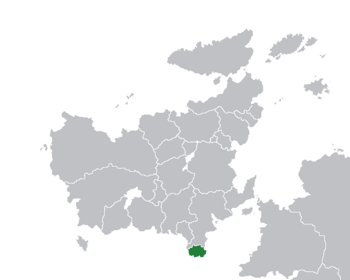Austerian People's Republic
Austerian People's Republic Republika Popullore Austeriak (Tethian) | |||||||||
|---|---|---|---|---|---|---|---|---|---|
| 1947–2005 | |||||||||
| Motto: Qytetarët bashkohuni! "Citizens unite!" | |||||||||
| Anthem: The Internationale | |||||||||
 Location of the Austerian People's Republic (green) in Euclea (light grey) | |||||||||
| Capital | Kartha | ||||||||
| Official languages | None | ||||||||
| Recognised national languages | Tethian Montesurian Novalian Piraean | ||||||||
| Religion | State atheism | ||||||||
| Demonym(s) | Austerian | ||||||||
| Government |
| ||||||||
| First Secretary | |||||||||
• 1946-1980 | Omer Kotta | ||||||||
• 1980-1987 | Adil Majko | ||||||||
• 1987-1988 | George Simion | ||||||||
| Chairman of the Presidium | |||||||||
• 1963-1964 (first) | Marcian Zerea | ||||||||
• 1987-1988 (last) | Sotir Godo | ||||||||
| Premier of Austeria | |||||||||
• 1988-1996 (first) | Sotir Godo | ||||||||
• 2005 (last) | Petru Gheorghiu | ||||||||
| Historical era | Great Game | ||||||||
| 1947 | |||||||||
| 13 February, 1947 | |||||||||
• Death of Omer Kotta | 6 August 1980 | ||||||||
| 1982-1987 | |||||||||
| 1988 | |||||||||
• Olive Revolution | 10 September 2005 | ||||||||
| 9 November 2005 | |||||||||
• Abolished by decree | 31 December 2005 | ||||||||
| Currency | Libro (Ⰾ/₤) | ||||||||
| |||||||||
The Austerian People's Republic (Tethian: Republika Popullore Austeriak), was a socialist country that existed from 1947 to 2005 as the direct predecessor of the modern-day Republic of Austeria. It was established by the Austerian Liberation Front, led by Omer Kotta, after the defeat of the Greater Solarian Republic in the Solarian War. For the majority of its existence it was ruled as a one-party state until 1988, when it was reformed into a nonpartisan council republic. It governed until the Olive Revolution in 2005 led to the abolishment of the socialist system. The country was bordered by the Acheloian Sea to the south and west and the Solarian Sea to the east, and Etruria to the north. The country bordered Piraea's Tarpeia region in the northwest until it was annexed by the Etrurian military dictatorship in 1962.
The Austerian People's Republic traces its origin to the formation of the Austerian Liberation Front in October 1943 during the Solarian War to resist the Greater Solarian Republic. Following the war, a provisional government was briefly established until the declaration of the socialist state in February 1947. For the majority of its history, the country was ruled mainly by Omer Kotta and the Front, who espoused Equalism and a common national identity, not based on ethnic or sectarian ties. Socialist Austeria was a close ally of the South Euclean People's Republic and cooperated on a variety of issues, such as support for the Novalian Revolutionary Front. Domestically the government supported state socialism and aggressively promoted a common Austerian identity based upon a combination of socialist patriotism and common cultural and historical traditions. Despite officially being an atheist state, the government supported religious freedoms and the Galeneic project, although it maintained firm control over religious life in the country.
Austeria began to destabilize following the death of Omer Kotta on 6 August 1977 and the Amathian Revolution a few years later, which crippled the SEPR. Ethnic and sectarian tensions erupted into the Austerian Counterrevolution where fighting between ethnic and sectarian paramilitaries which grew into guerrilla warfare between them and the state. The violence significantly escalated after the Novalian Revolutionary Front joined the conflict against the paramilitaries and the Austerian government. In 1987, reformist elements within the Front entered negotiations to end the conflict, leading to the Yndyk Agreement. As part of the agreement, the government dismantled the single-party system of government, transitioned from a centrally planned economy to market socialism, and adopted democracy based upon the Valduvian model. Despite initial stability, ethnic and sectarian tensions remained, which gradually led to political dysfunction and economic stagnation. The 2005 financial crisis would lead to the Olive Revolution and the collapse of the socialist system. In the 2005 election, a coalition of non-socialist ethnic and sectarian candidates won a majority in the legislature and formed an interim government.
The Austerian People's Republic was officially dissolved by decree by intern President Taulant Balla on 31 December 2005. The 1988 constitution was partly abrogated to remove all references to socialism; but the majority of the clauses remained. While attempts to draft a new constitution have occurred, it remains in force today with several amendments.

